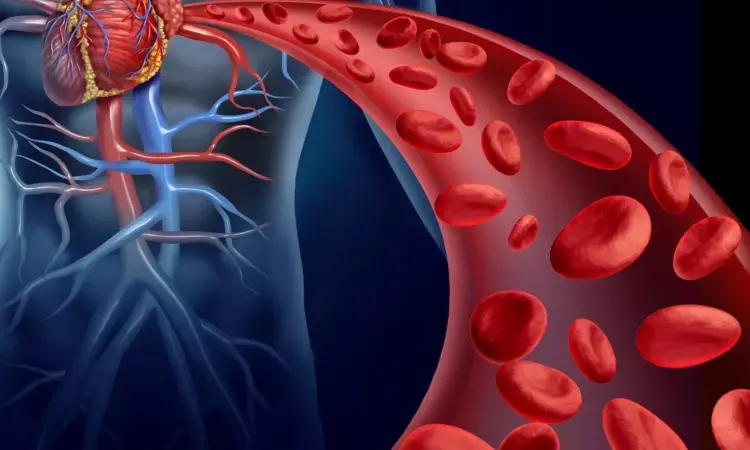- Home
- Medical news & Guidelines
- Anesthesiology
- Cardiology and CTVS
- Critical Care
- Dentistry
- Dermatology
- Diabetes and Endocrinology
- ENT
- Gastroenterology
- Medicine
- Nephrology
- Neurology
- Obstretics-Gynaecology
- Oncology
- Ophthalmology
- Orthopaedics
- Pediatrics-Neonatology
- Psychiatry
- Pulmonology
- Radiology
- Surgery
- Urology
- Laboratory Medicine
- Diet
- Nursing
- Paramedical
- Physiotherapy
- Health news
- Fact Check
- Bone Health Fact Check
- Brain Health Fact Check
- Cancer Related Fact Check
- Child Care Fact Check
- Dental and oral health fact check
- Diabetes and metabolic health fact check
- Diet and Nutrition Fact Check
- Eye and ENT Care Fact Check
- Fitness fact check
- Gut health fact check
- Heart health fact check
- Kidney health fact check
- Medical education fact check
- Men's health fact check
- Respiratory fact check
- Skin and hair care fact check
- Vaccine and Immunization fact check
- Women's health fact check
- AYUSH
- State News
- Andaman and Nicobar Islands
- Andhra Pradesh
- Arunachal Pradesh
- Assam
- Bihar
- Chandigarh
- Chattisgarh
- Dadra and Nagar Haveli
- Daman and Diu
- Delhi
- Goa
- Gujarat
- Haryana
- Himachal Pradesh
- Jammu & Kashmir
- Jharkhand
- Karnataka
- Kerala
- Ladakh
- Lakshadweep
- Madhya Pradesh
- Maharashtra
- Manipur
- Meghalaya
- Mizoram
- Nagaland
- Odisha
- Puducherry
- Punjab
- Rajasthan
- Sikkim
- Tamil Nadu
- Telangana
- Tripura
- Uttar Pradesh
- Uttrakhand
- West Bengal
- Medical Education
- Industry
Hydroxyurea improves cardiac abnormalities in young patients with sickle cell anemia: Study

Prolonged hydroxyurea therapy may reverse cardiac complications in children and young adults with sickle cell anemia.
USA: Cardiac abnormalities such as left ventricular hypertrophy, dilation, and pulmonary hypertension are common in children and young adults with sickle cell anemia. A recent study in the journal Blood Advances has provided evidence that prolonged hydroxyurea therapy in such patients may lead to reverse cardiac remodeling and improve these cardiac abnormalities.
Hydroxyurea is a disease-modifying therapy for sickle cell anemia that has been used for several decades. However, there is a lack of longitudinal assessment of echocardiographic abnormalities in children and young adults having sickle cell anemia. To fill this knowledge gap, Arushi Dhar, Cohen Children's Medical Center, New Hyde Park, New York, United States, and colleagues aimed to determine the prevalence of echocardiographic abnormalities in children and young adults with sickle cell anemia and to examine the effects of hydroxyurea on reverse cardiac remodeling.
Working towards their aim, the researchers reviewed the records of patients with sickle cell anemia who underwent routine cardiac screening at Cohen Children's Medical Center between 2010 and 2017. This was followed by a retrospective longitudinal analysis of echocardiograms performed on patients receiving treatment with hydroxyurea. Data on a total of 100 patients with sickle cell anemia were analyzed; 60 (60%) were on hydroxyurea.
Key findings include:
- 41.6% of the patients on hydroxyurea had been treated for less than 1 year; these patients had a significantly greater prevalence of left ventricular dilation compared to those who had been on treatment for more than 1 year.
- Serial echocardiograms were then analyzed on patients receiving hydroxyurea.
- Left ventricular dilation and hypertrophy improved significantly with hydroxyurea treatment.
- The left ventricular volume and mass correlated negatively with duration of treatment with hydroxyurea.
Based on the results, the authors concluded, "timely initiation of treatment with hydroxyurea may lead to reverse cardiac remodeling and improvement in these cardiac abnormalities. Future studies should attempt to follow this patient cohort for a longer duration."
Reference:
The study titled, "Longitudinal analysis of cardiac abnormalities in pediatric patients with sickle cell anemia and effect of hydroxyurea therapy," is published in the journal Blood Advances.
DOI: https://doi.org/10.1182/bloodadvances.2021005076
Dr Kamal Kant Kohli-MBBS, DTCD- a chest specialist with more than 30 years of practice and a flair for writing clinical articles, Dr Kamal Kant Kohli joined Medical Dialogues as a Chief Editor of Medical News. Besides writing articles, as an editor, he proofreads and verifies all the medical content published on Medical Dialogues including those coming from journals, studies,medical conferences,guidelines etc. Email: drkohli@medicaldialogues.in. Contact no. 011-43720751


